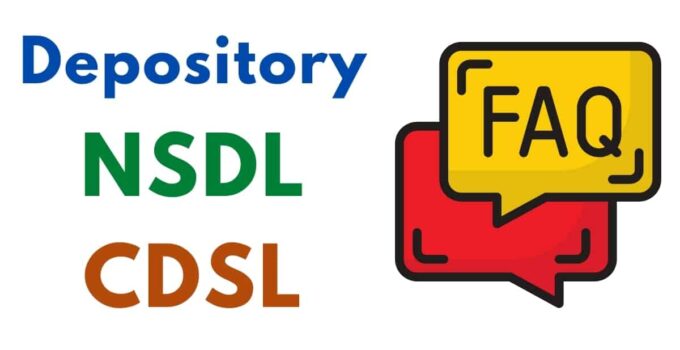The Depository Act was passed by Parliament in 1996. The Securities and Exchange Board of India (SEBI) was appointed as the regulator to control depository operations. Accordingly, NSDL was established in the year 1996-97 by NSE, IDBI, SBI and other institutions. The CDSL Depository was established in 2001-02 by BSE, Bank of India, Bank of Baroda and others. Depository Act 1999 (2) SEBI Act (3) NSDL – CDSL Bylaws (Biology) (4) PMLA Prevention of Money Laundering Act 2002 as amended in 2005 as per the legal provisions mentioned below.
Frequently Asked Questions about Depository
There are lots of questions in the minds of investors. So we have listed these below. Before knowing the answers to the your query’s we’ll see the terms & shorts form used related to this.
- Depository: which takes control of demat accounts.
- DEMAT: Convert hard copy security into electronic form.
- Rematch: Electronic security in tangible hard copy / certificate / certificate
- Beneficial Owner: whose account is opened with DP.
- Depository Participant: to whom the name of BO is registered
- SEBI: Regulator for Depository
- Issuer: Security, Issuer of shares, Debentures etc.
- ISIN: The identification number given by SEBI for filing depository.
- Demat Request Form (DRF): Form for DEMAT of Security
- Transposition: Changing the order of names of BOs of issued certificates,
- TRPF: Transposition Request Form for those who do not have DEMAT accounts.
Let’s start the FAQ.
What is a Depository?
A depository is a facility that saves investments in securities (shares, securities, etc.), which makes it possible to process securities transactions through book entry (bookkeeping). Depository securities can be immobilized or dematerialized to achieve this goal. (Which means that their existence is only in the form of electronic records?) India has adopted the path of DEMAT. Depository is an institution in India which protects the security of the beneficial owner electronically through a Registered Depository Participant (DP). The depository generally acts like a commercial bank. To avail the depository services, the investor has to open an account through a registered DP.
Which are the major depositories in India?
NSDL: National Security Depository Limited & Headquarters located in Mumbai.
CDSL: Central Depository Services Limited & Headquarters located in Mumbai.
Who is the main promoter of NSDL?
National Stock Exchange (NSE)
Who is the main promoter of CDSL?
Bombay Stock Exchange (BSE)
Who is the regulator for the Depository?
Securities and Exchange Board of India (SEBI)
What is Beneficial Owner (BO)?
Beneficial Owner (BO) is the person in whose name the account is opened and the person whose name is registered with the depository to deposit the security electronically.
Who is a Depository Participant?
Depository Participants (DPs) are Depository Agents authorized to provide depository services to investors, SEBI as well as financial institutions, banks, custodians and stock brokers who meet the requirements specified by the Depository can register as DPs. More information about DP can be found at www.cdsilndia.com. S. L. Can be found on the website.
Who is an Issuer?
An issuer is an institution that issues securities.
(ISIN) What is ISIN?
ISIN (International Securities Identification Number) is the identification number given by SEBI when entering a securities depository system.
Will the different securities (ISIN) issued by the same issuer?
No. Different security (ISIN) numbers issued by the same issuer will be different.
What services are provided by depository?
D.P. The following services may be available through.Demat is the conversion / conversion of paper security into electronic form.
Rematerialisation, i.e. the conversion of electronic security balances in a BO’s account into a tangible form.
Keeping records of security in electronic form.
B. O. To complete the transaction by giving / accepting the demat account of / to the security in the account.
Fulfillment of off-market deals in two investment doors (in) BO outside the stock market.
IPO by issuers. Or to arrange for the deposit of securities offered in other ways to the demat account through electronic means.
Like distribution of bonus or right shares in electronic form on behalf of demat account holders. Non-cash corporate benefits or acceptance of securities after merger of companies, split of shares or merger / amalgamation.
Registration of demat securities mortgages and if the DP is duly registered as an approved intermediary for the work concerned, then lend / take the security.
Investors who already have a demat account. Can he open another demat account?
Yes. The investor can open another demat account even though he has one demat account.
Is there any nomination facility available in demat account?
Yes. Demat accounts have the facility to nominate each person and register your heirs.
Do all DPs charge fees for opening an account?
Many DPs charge service charges for opening an account as well as maintenance of accounts.
Can all securities be dematerialized from a single demat account?
Yes, any number of securities credited to the demat system can be dematerialized or held from a single demat account. However, the security must be registered in the name of the same customer (BO).
BO (Beneficial owner) Is it necessary to keep some balance of securities in your demat account?
Demat account can also be opened or maintained with zero balance. The depository usually does not charge any custody fee from your DP (Depository Participant). Therefore, the demat account holder does not have to pay any custody charges based on ISIN.
What to do if any error or omission / mistake is found in the statement statement of demat account?
If errors are found in the statement B.O. D.P. If the error is not rectified, the customer can lodge a complaint with the NSDL / CDSL.
What happens if he loses his security statement or depository passbook?
In such a case, BO should immediately turn to the DP for loss of security statement and apply for duplicate statement.
No third party has the right to give any notice on the basis of account statement.
Can all DPs contact the account of all Depository BO’s?
No. The DP of NSDL, CDSL can only view your account holder’s accounts and their transactions. Other DPs can only view your account holders’ accounts and their transactions. They cannot view other DP’s customer account transactions.
Is Dematerialization Compulsory?
Under the Depositories Act (Demat Act 1996), investors can hold their shares in either physical or electronic form. Although up to 500 shares are allowed to be transacted in tangible form, due to mismatch of signatures, forgery / falsification of signatures, forged certificates, etc., one is usually willing to transact in tangible form, fearing the authenticity of the shares to be handed over. No.
What is the procedure for Dematerialization ?
In order to dematerialize any tangible security, you have to open a demat account with the DP of your choice. After that just fill up a DRF (Demat Request Form) and you have to fill up the Shares Bond / Security Certificates Form and hand over your Shares Bond / Security Certificates to the DP for demat. The DP defaults the certificates and sends them to the concerned issuers / registers. DPs deposit the same number of securities in demat accounts. A different DRA should be used for each scrip.
Is it mandatory to mention ISIN of security while filling DRF (Demat Request form)?
Yes – Dematerialization / Delivery of appropriate securities has been made. To ensure this, it is necessary to mention ISIN in the DRF as well as in the debit / credit notice. However, if the investor does not know the ISIN of his stock / certificate, he should know it from the DP or from the NSDL / CDSL website of the depository.
Is transfer deed required for dematerialization of tangible certificate?
No – there is no need to fill in the transfer deed. The DRF available with the DP should be accompanied by a tangible certificate.
Can one keep some of his security in demat form and some in the form of tangible documents / certificates?
Yes, it depends on the will of the investor. However, it is better to have all securities in demat form. This is because the securities capacity of such securities is important when it comes time to take immediate advantage of market deals.
If a person wants to demat the security of a company which has not filed a depository (NSDL / CDSL), why should he do so?
In such a case, the investor should request the concerned company to deposit the securities in the depository. It is pertinent to mention here that, as per SEBI rules, the issuer company is required to submit the security deposit to the depositor after making such a request by an investor.
Can an odd lot of 26 shares be dematerialized (DEMAT)?
Yes, the market lot in the form of demat is a single stock and so the question of odds does not arise.
Do dematerialized shares have special or different certificate numbers?
Dematerialized shares do not have specific or separate certificate numbers. In demat, all the shares are completely fungible, meaning that 100 shares of a company are like any other 100 shares.
Can the security held in electronic form be converted back to certificate form?
Yes, this action is called rematerialization. This means re-embedding the security held in electronic form. For this, BO has to request Remat Request Form (RRF) from his DP and submit it. The DP forwards the relevant request to the issuer / register electronically after verifying that the securities are adequate in the respective accounts. The issuer / registrar sends the tangible certificates directly to the beneficiary owner BO.
Is there any charge for dematerialization of tangible certificates?
Although the depository does not charge any charge / charges from the DP for dematerialization of securities, the DP charges a demat charge along with postage courier charges.
Who can nominate?
Individuals applying / holding for shares / bonds / debt bonds in their own name or jointly with one or two other persons can nominate. If the shares are jointly named, all the holders are required to sign the nomination form.
Who cannot nominate?
Societies Trust Body Corporates, Partnership Firms, Activists of Hindu Undivided Family (HUF), Power of Attorney holder
Can nominations be made in the name of a minor?
Holders of shares / debentures can nominate a minor on behalf of one of his parents or guardians.
Who cannot be appointed as nominated heir?
Trusts, Societies, Body Corporates, Partnership Firms, Doers of Hindu Undivided Family (HUF) or Power of Attorney holders cannot be appointed as nominated heirs.
Can a NRI be nominated as heir by nomination?
Both NRIs and NRIs can inherit NRIs. Similarly, NRIs can appoint a resident Indian or another traveling Indian (NRI) as heir.
How many heirs can be appointed?
Only one person can be appointed as heir, whether the security is in one’s name or joint name. Alone B.O. (BO) or in case of death of all the BOs in the joint holding, the heirs will benefit from all the securities in the demat account.
What is transposition?
Transforming the order of names in issued certificates like (BA) instead of (AB) is called transposition.
What is the significance of transposition in demat?
Sometimes, the owner of the securities holds the security jointly with one / two / three persons in different order for different reasons. Since the same sequence of names is taken into account when dematerializing through a demat account, such an investor may have to open multiple demat accounts according to the name sequence. To avoid this, the transposition-cum-demat facility offered by the investor through the depository should be considered.
Should a separate TRPF be paid for each ISIN?
Yes.
What exactly does BO have to do for Transposition – for cum-dematerialization?
BO should submit your application in Transposition Request Form (TRPF) along with DRF Share Security Certificates.
Should a separate TRF be paid for each matching called 38?
No. Different combinations of names can be listed in a separate box in section (c) of TRF. If the space provided in the TRPF is not sufficient, a separate form or annexure should be added.
What are the requirements to get transposition cum demat facility?
The BO account in which the name is opened must match the records of all the six holders on the TRPF.
What additional charge / fee does the depository charge for the processing of transposition cum demat request?
No, there is no charge from the Depository DP for transposition-less dematerialization proceedings.
Can application for transposition request can be made with Remat form?
No, the application for transposition cannot be used with the request for rematalization.
Take a Look




